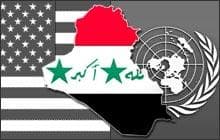Advertisement
The U.S. Role in the World
Resume Now that the end of the war is at least in sight, there's tension over competing visions for who will administer postwar Iraq. For the United States, critical choices loom about what kind of global power it now wants to be.
Now that the end of the war is at least in sight, there's tension over competing visions for who will administer postwar Iraq. For the United States, critical choices loom about what kind of global power it now wants to be.Timothy E. Wirth, President of the United Nations Foundation and the Better World Fund and former U.S. Senator, says that, if the new American foreign policy of unilateral, preemptive engagement in the world continues, it will further isolate and alienate the U.S. from the rest of the world.
Stephen Schwartz, Director of the Islam and Democracy Program at the Foundation for the Defense of Democracies, says that, given its poor success record in Bosnia and Kosovo, the U.N. should not be in charge of the reconstruction process in Iraq or take on the role of a world leader at large.
Jack Beatty, On Point News Analyst and Senior Editor at The Atlantic Monthly, says that the U.S. can not seek legitimacy for its foreign policies from the gun barrels in the battlefields but through consensus and compromise at the U.N.
Click the "Listen" link above to hear more about what role the U.S. should play in postwar Iraq and around the world.
Guests:
Timothy E. Wirth, President of the United Nations Foundation and the Better World Fund and former U.S. Senator
Stephen Schwartz, Director of the Islam and Democracy Program at the Foundation for the Defense of Democracies
Jack Beatty, On Point News Analyst and Senior Editor at The Atlantic Monthly
This program aired on April 10, 2003.